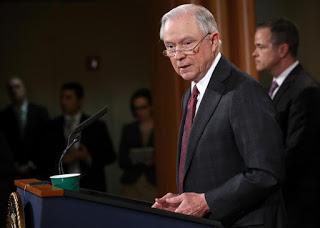
Jeff Sessions
We wrote last Tuesday about the complications that might arise if someone filed a bar complaint against Trump Attorney General Jeff Sessions, in light of his false statements to Congress about meetings with a Russian ambassador during the 2016 campaign. It didn't take long for someone to file that complaint.Boston attorney J. Whitfield Larrabee filed a complaint against Sessions with the Alabama State Bar last Thursday (March 9), just two days after our report, based on statements from Western Michigan University law professor Victoria Vuletich. How's that for swift action? (The Larrabee complaint and attachments are embedded at the end of this post.)
On the same day, the ACLU also filed a bar complaint against Sessions. If the Trump AG thinks he isn't in hot water, perhaps he should check with domestic diva Martha Stewart. (More on that subject in a moment.)
Larrabee minces no words in his statements about Sessions' actions:
The complaint accuses Sessions of violating the Alabama Rules of Professional Conduct by committing perjury and other crimes when he testified before the Senate Judiciary Committee on January 10, 2017. The complaint alleges that Sessions committed crimes when he falsely testified that he had no communications with the Russians during the election campaign and when he subsequently engaged in a cover up. In my opinion, Sessions’ continuing service as Attorney General amounts to a serious conflict of interest, violates the integrity of the United States Department of Justice and is a form of corruption.
I've filed two or three complaints against various lawyers with the Alabama State Bar, and each time, I received nothing but a letter stating no investigation would even be conducted. I concluded the state bar is a corrupt right-wing outfit (which it is) that serves up protection, more than discipline, for Alabama lawyers -- at least those who are connected to major firms or the state's GOP noise machine. I decided to forego bar complaints and make more productive use of my time.
It might not be so easy for the bar to brush off Larrabee's complaint against Jeff Sessions. To be sure, Sessions is precisely the kind of lawyer the Alabama State Bar likes to protect. He has the right-wing bona fides, and he likely is the organization's best known member. But Larrabee is a lawyer himself, he clearly is not a lightweight, and Sessions' violations of the bar code came in public view, with a national and international audience. It's going to be hard to ignore them.
If the Alabama State Bar hasn't grown a spine, it might need to grow one in a hurry. Long-time general Counsel Anthony McLain died in January. Experience taught me that McLain was little more than an empty suit and an obstructionist. In fact, he was at the controls when Alabama's legal community spiraled into a mass of corruption and malfeasance, and there is little evidence to suggest McLain did anything about it. If Tony McLain were still alive, there is little doubt he would do his best to provide cover for Jeff Sessions.
What happens now that McLain is gone? According to the bar's Web site, it appears no one has been appointed to replace McLain, even on an interim basis. The bar has three assistant general counsels -- Jeremy McIntire, Mark Moody, and Tripp Vickers -- and they all probably are right-wingers without an ounce of integrity among them. The Sessions story could shine a glaring spotlight on the incompetence and corruption that has plagued the Alabama State Bar for years.

J. Whitfield Larrabee
As for Larrabee, he has demonstrated a willingness to step on powerful toes when they appear to have danced into unethical and perhaps criminal territory. He filed multiple complaints against candidate Donald Trump and Florida Attorney General Pam Bondi over apparent bribery. (See here, here, here, and here.) From Larrabee's complaint against Sessions:Beginning on or about January 10, 2017, Sessions engaged in unethical and criminal conduct in violation of the Alabama Rules of Professional Conduct.
Sessions violated Rule 8.4(b) by committing a criminal act or criminal acts that reflect "adversely on the lawyer’s honesty, trustworthiness or fitness as a lawyer in other respects."
Sessions violated Rule 8.4(c) by engaging “in conduct involving dishonesty, fraud, deceit or misrepresentation.”
Sessions violated Rule 8.4(d) of the Alabama Rules of Professional Conduct by engaging "in conduct that is prejudicial to the administration of justice."
Sessions violated other provisions of the Alabama Rules of Professional Conduct by giving false testimony to a legislative body, by failing to take reasonable and appropriate measures to remedy this misconduct, by affirmatively acting to cover up and conceal his misconduct, and by failing to avoid conflicts of interest in his activities as a lawyer and public official.
Larrabee provides background on events leading to Sessions' false statements, in response to questions from U.S. Sen. Al Franken (D-MN):
On January 6, 2017, the United States government released a report expressing the conclusion of the FBI, CIA and NSA that Russia engaged in a campaign of cyberattacks, propaganda, and mis-information in order to aid Trump to win the presidential election. This report gained a great deal of coverage in the news media such that it very likely came to the attention of Sessions.
Prior to January 10, 2017, the FBI and US government intelligence agencies concluded that Russian operatives were behind the hacking of the computers of Democratic National Committee and of the email account of John Podesta, chairman of Hillary Clinton’s presidential campaign.On January 10, 2017, Sessions gave sworn testimony before the Senate Judiciary Committee in a hearing concerning his confirmation as Attorney General.
In the hearing, Sessions told Franken, "I did not have communications with the Russians," even though Franken never asked him if he had. On March 1, The Washington Post reported that Sessions had met at least twice with Russian ambassador Sergey Kislyak during the 2016 campaign:
Larrabee outlines the elements of perjury under U.S. law and then states:
Evidence establishes that Sessions is guilty of perjury in violation of 18 U.S.C. § 1621.
After giving false, deceitful, dishonest, fraudulent and misleading testimony to the Senate Judiciary Committee, Sessions participated in a cover-up of his criminal, dishonest and unethical conduct.
On March 1, 2017, the Washington Post reported that Sessions met with Kislyak twice in 2016 and that he failed to disclose the meetings when asked by Franken.
On March 1, 2017, Sessions’ spokeswoman, Sarah Isgur Flores (“Flores”) responded to the Washington Post report. Referring to Sessions’ testimony before the Senate Judiciary Committee, Flores stated: “there was absolutely nothing misleading about his answer." Flores is the Director of Public Affairs at the Department of Justice and is under Sessions supervision.
On March 1, 2017, in response to the Washington Post report, Sessions issued a statement through Flores: “I have never met with any Russian officials to discuss issues of the campaign. I have no idea what this allegation is about. It is false.”
Sessions’ denials of the Washington Post report, and his assertion that the report was false, was itself false, misleading and dishonest. The Washington Post never reported that Sessions and Kislyak discussed issues of the campaign. Sessions’ statement about the Washington Post report included at least one lie.
Once the false statements before Congress became public knowledge, Sessions made the situation worse, Larrabee states:
Because Sessions’ testimony denying that he had communications with the Russians was false and misleading, it was dishonest for him to allow Flores to speak on his behalf and to assert that “there was absolutely nothing misleading about his answer."
On March 6, 2017, Sessions submitted a letter to the Senate Judiciary Committee supplementing his testimony on January 10, 2017. (Letter from Sessions to Charles E. Grassley, Chairman of the Senate Judiciary Committee, attached hereto as Exhibit “A.”)
Sessions claimed in the letter that his response to Franken, denying any communications with the Russians during the campaign, “was correct.” Rather than acknowledge the falsity of his prior testimony, Sessions willfully and deliberately insisted that his prior false testimony was correct. In doing so, Sessions made an additional material false statement to the Senate Judiciary Committee and attempted to conceal and cover up his prior false testimony and perjury.
This represents a violation of 18 U.S.C. 1001, Larrabee asserts. It's not unusual for individuals to go to prison for violating Sec. 1001, "Lying to Government Agents." The statute ensnared Martha Stewart, and Larrabee makes it clear that Sessions' issues go way beyond perjury. In fact, his issues go to the heart of possible criminality in the Trump administration:
The FBI and the United States Department of Justice (“DOJ”) are currently investigating links between associates of Trump, the Trump campaign and the Russian Government.
The individuals associated with the Trump campaign who were in contact with Russian officials include: Trump’s former National Security Advisor Michael Flynn, Trump’s advisor and son in-law Jared Kushner, Trump’s former campaign manager Paul Manafort, Trump’s foreign policy advisor Carter Page, Director of National Security for the Trump campaign J.D. Gordan and Sessions. None of these individuals were properly registered as agents of the Russian government under the Foreign Agents Registration Act, 22 U.S.C. § 611, et. seq. Trump and his representatives repeatedly and falsely denied that these contacts with Russian officials occurred. . . .
All of this points to violations of United States Campaign Finance Act, 52 U.S.C. § 30121. Again, the Larrabee complaint goes way beyond Sessions and way beyond perjury:
Collusion with Russia by individuals associated with a political campaign, who are not registered as foreign agents of Russia, in order to aid Russia in influencing the election of the President of the United States, would be a criminal violation of the Foreign Agents Registration Act.
Kislyak and Sessions were likely in contact because of Sessions’ position and relationship with Trump and his campaign. Sessions was not part of the Senate Foreign Relations Committee. Except for his participation in the Trump campaign, there were few other reasons for the Russian ambassador to want to communicate with Sessions in the midst of an election. The primary reason Kislyak communicated with Sessions was his role in the Trump campaign, not his role as a Senator.
Sessions’ contacts with the Russian ambassador during the election campaign and his false and misleading statements denying these contacts are specific facts that give rise to a reasonable suspicion that Sessions was involved in criminal activity related to Russian interference with the 2016 election.
Let those words sink in for a moment: "Sessions was involved in criminal activity related to Russian interference with the 2016 election." This suggests a scandal that might dwarf Watergate in scope and seriousness.
And one of Alabama's senior political figures appears to be at the heart of it.
